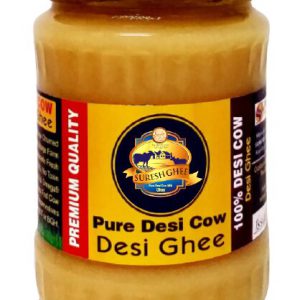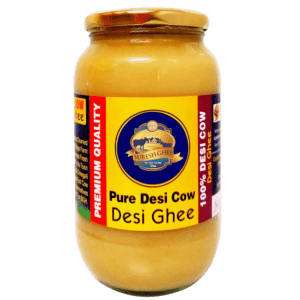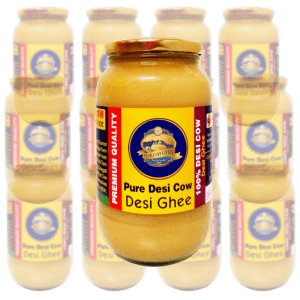Desi Ghee is a type of clarified butter that is not only used in the dishes, but also in medicines and traditional religious rituals in many parts of South-East Asia.
In India, we have been using Desi Ghee for ages. The benefits of desi cow ghee have been told by our mothers and grandmothers from one generation to another generations. They give us numerous reasons to incorporate pure desi ghee into our daily diet.
Ghee is being suggested to have a healthy life, strong bones, sharp eyes, a healthy stomach, glowing skin and hair. A complete way of a healthy life is using a dash of ghee in your regular food. You may even cook your food in desi ghee; it has a high smoke point. Ayurveda suggests that Ghee is a very good carrier for transferring benefits of other herbs. Old Ghee itself is medicine. “Ghee” comes from the Sanskrit word meaning “sprinkled,” and it basically means that the milk fat is rendered from the butter to separate the milk solids and water. Traditionally it is made by churning curd. Butter (Makkhan – मक्खन) so obtained is warmed to get ghee. You’ll be left with a yellow liquid when it’s hot and a creamy looking solid once when the ghee cools down.
However, in our families, we have heard thousands of reasons to incorporate Desi Cow Ghee into our diet. Here are a few:
1. High Smoking Point:
High smoke point properties make ghee an excellent cooking medium for frying, sauteing and even baking. Since it cooks at a higher point than almost any other oil, it won’t break into free radicals like other ones. Free radicals can potentially be harmful to one’s health, and when an oil smokes, it can be hazardous to a person’s respiratory system if constantly breathed in.
Because there’s no water in ghee (remember, it evaporated when the butter simmered), ghee has a higher smoke point than butter, about 465º F compared to butter’s 350º F. It cooks without sputtering, smoking or burning, making it friendly for grilled cheese, chilaquiles, breakfast potatoes, and more.

2. Lactose Friendly
Since it’s made from milk solids, the impurities have been removed, so people who are lactose intolerant usually have no problems consuming ghee. However, be sure to consult with your physician before trying it. Because ghee is clarified, it’s both casein and lactose-free. People who are officially lactose intolerant (or lactose-free) eat it and digest it. Most ghee recipes instruct discarding the milk solids.
3. Long Shelf Life
It does not need refrigeration. According to Care2, some ghee mixtures last up to 100 years. Because there is no water in ghee, bacteria won’t grow there, so you can skip refrigeration. To keep ghee shelf-stable be sure your jar of ghee remains both water and steam-free; don’t place it right next to the steaming stovetop. If your ghee gets tainted with water or food, then refrigerate; it’ll be fine for future use.

4. Promotes Flexibility:
According to Dr. Vasant Lad, director of the Ayurvedic Institute in Albuquerque, N.M., ghee helps to lubricate the connective tissue and promote flexibility. This is why many yoga aficionados and practitioners consumer Desi Ghee other than butter.
5. Rich in Essential, Health-Boosting Vitamins, Minerals and Nutrients
Ghee is rich in healthy fat-soluble vitamins such as vitamins A, D, E, and K. According to doctors, these vitamins are important for promoting bone and brain health, and for boosting the immune system.
- Vitamin A: Unlike most foods, Vitamin A in ghee is in retinol form, meaning that it is in the most biocompatible form for the human body. Most of the vitamin A in our diets comes from beta-carotene, which requires the body to convert it into retinol before it can be used.
However, not everyone converts beta-carotene into retinol form as efficiently, and some people run the risk of mild-to-moderate vitamin A deficiencies if there is not enough retinol-from vitamin A in their diets. Vitamin A is important for eye, skin, hair and immune health among other things.
- Vitamin E: Ghee contains high amounts of vitamin E, one of the most powerful and important antioxidants in the human body.
- Vitamin K2: Essential for healthy bones and heart, vitamin K2 can be hard to get, as it is somewhat rare in most foods, but ghee is rich in it. Proper levels of vitamin K2 help to protect against tooth decay, support proper growth and development of bones, and protect against the calcification of the arteries, also known as atherosclerosis.
- Cholesterol: Despite being demonized by the media in past decades, cholesterol is essential for proper health, hormone production, brain function, nerve function, cellular health and a number of other highly important bodily functions, the consumption of which does not cause heart disease and blood clots as previously thought. Ghee supplies high-quality cholesterol to the body and brain.
- Omega-3 and Omega-9 Fatty Acids: As long as ghee is from grass-fed cows, it contains omega-3 and omega-9 fatty acids, which play a number of vital roles in the human body and are particularly important for mood and brain health, among other things.
- Conjugated Linoleic Acid (CLA): Abundant in ghee made from grass-fed cows’ milk, initial studies indicate that CLA may help to reduce tumors, lower cholesterol and high blood pressure, reduce inflammation and actually burn body fat.
6. Healthy Digestive Tract
Ghee converts fibre into butyric acid, which is beneficial to intestinal bacteria. It also helps to increase appetite, fostering better health and weight loss. Ghee is one of nature’s richest sources of butyrate (butyric acid), a short-chain fatty acid that causes intestinal wall cells to proliferate, meaning that it essentially causes the growth and repair of new tissues in the digestive tract. [1].
This has a number of benefits, from protection against colon cancer to the repair of a leaky gut syndrome, IBS, ulcers, ulcerative colitis, and Crohn’s disease, among other things. [1]
Toxins, gluten, antibiotics, and other allergens and pollutants enter our digestive tract through our food and medicines and can damage the intestinal lining over time, causing scarring and holes in the intestinal wall.
Butyric acid in ghee (when consumed regularly) works to reverse this damage and restore a healthy colon by soothing and reducing inflammation in the digestive tract and healing wounds in the mucus lining of the stomach and intestines.
Butyric acid is also balancing and strengthening to the gut flora (probiotic bacteria), is beneficial for reducing Candida overgrowth and other unwanted pathogens and balances hydrochloric acid levels in the stomach, which are frequently disturbed in those with digestive problems [3]. Even if you don’t have any major gut issues, ghee can strengthen digestion to new levels, improving nutrient absorption and overall health.
7. Lowers Cholesterol:
Studies have shown that ghee can reduce cholesterol both in the serum and intestine. According to the Times of India, it does this by triggering an increased secretion of biliary lipids.
The presence of cholesterol in ghee is beneficial for the human body. Understanding what type of cholesterol ghee has and how much quantity of cholesterol is present in cow ghee and buffalo ghee :
- Cow ghee cholesterol level- 0.32%
- Buffalo ghee cholesterol level- 0.27%
When you consume 1 teaspoon of ghee it consists of 8 grams of saturated fats and around 32 mg of cholesterol. According to the experts, if you have high cholesterol levels you should limit your regular ghee consumption to less than 1-2 tsp per day.
A human body consists of good cholesterol (HDL) and bad cholesterol (LDL). Spike in the level of LDL keeps you at risk of having a heart problem. Hence, a high level of LDL is considered unhealthy. After consuming different foods, either of the cholesterol levels can change based upon the nutrient obtained from it. Consuming grass-fed ghee in the accurate amount, it can spike the level of HDL (good cholesterol) and supports to decrease the level of LDL (bad cholesterol) in the blood. Therefore, cholesterol in ghee is supposed to be considered nutritious.
In order to keep your cholesterol levels within certain levels then minimal consumption of grass-fed ghee will lead to no harm. Intake of ghee in moderate quantities would not affect your LDL cholesterol levels.
Consuming 1-2 teaspoons of ghee along with a healthy diet routinely, a person would be able to manage the cholesterol levels. Consumption of ghee can influence your cholesterol levels positively if you understand how much quantity is suitable best for your condition. As much as you are consistent with an overall nutritious diet, you can add a minimal quantity of ghee to your routine diet to gain its complete health benefits.
8. Weight Loss
When the ghee is obtained from grass-fed cows, it contains cancer-fighting fatty acid conjugated linolenic acid (CLA), which aids in weight loss.
Apart from the above 8 reasons, there are many other benefits of desi ghee. Desi cow ghee is made from the milk of grass-fed cows. It is good for boosting brain cells and increasing memory power. Ghee is a very good immunity booster and we must use it when weather change or climate change.
Ghee keeps our guts healthy by detoxifying our stomach and keeping the digestion process clean. Ghee use is not limited to eating, it can be used for medicines and massages too. But moderation is a key to leading a healthy life.
Here are 10 reasons why ghee may be a superfood.
- Ghee is nutritionally dense, meaning it’s packed stuffed with fat-soluble vitamins A, D, E, K, and health-benefiting nutrients, key players in overall health.
- Ghee could be a versatile and proven effective carrier of the vitamins, minerals, and nutrients with which it’s loaded. The traditional Indian staple may be employed in nearly any dish and is eaten as at some Indian weddings.
- The cholesterol-rich saturated fats in ghee provide the components needed to make testosterone, estrogen, and more.
- Ghee is formed from butter, a vital source of butyrate and butanoic acid, a detoxifier known to possess many positive health benefits.
- Moderately, the cholesterol in ghee could be a positive force within the body, which produces more of it during times of stress and/or sickness, especially when there’s inflammation.
- Ghee is enriched with omega-3 fatty acids, cooked down its butterfat promotes the strong natural antioxidants adept at removing toxins from the body.
- Though made up of butter, ghee is lactose-free because the ages-old cooking process wont to make this gift to the palates and health of the lactose intolerant.
- It’s easily digestible! due to its properties.
- Ghee has been used as a treatment for a large sort of ailments over thousands of years, for everything from the flu to joint pain, and while a skin moisturizer.
- Ghee may be a superfood because it will be stored at temperature and has an unbelievable staple shelf life, especially useful in warmer areas of the world.






 WhatsApp us
WhatsApp us
Naveen m...